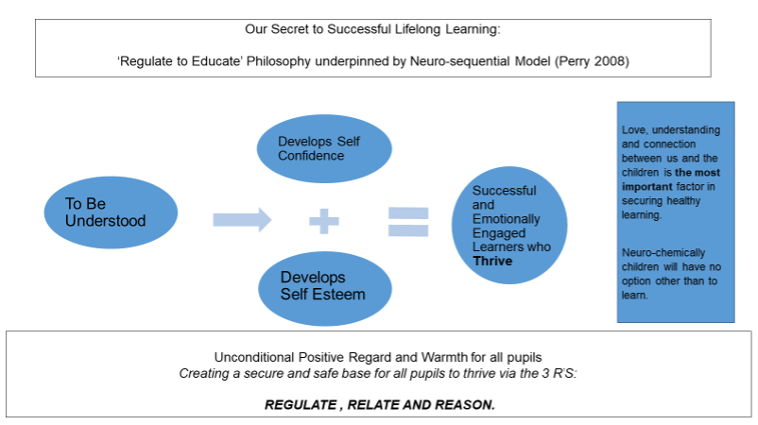Emotional Regulation & Support
Our learners all have different emotional support needs and we tailor our approaches to each individual to ensure that they learn to self-regulate in order to be happy and ready to learn.
Newfield Principles of Positive Behaviour Support – Regulate to Educate
A whole school approach is needed to develop appropriate behaviours to support life-long learning, independence and full inclusion in society for all our learners.
This works at 3 levels to ensure the safety of the community and help our students learn to manage and regulate their own behaviours:

| FOCUS | WHAT WE DO |
|---|---|
| School values and practice
This involves everyone in school |
|
| Classroom practice supporting above via continuity of message and approach | Staff implement activities across the day to support optimal arousal levels for maximum engagement; sensory lifestyle for all pupils at 3 levels:
|
| Individual Interventions and Support
Enhanced support where whole class approach is not sufficient |
|
Our aims in supporting emotional regulation are:
- More time spent on learning instead of on ‘behavior management’
- A common language for for communication, problem solving, and emotional understanding
- Increased student self-awareness and social and emotional skills
- Systems for building regulation strategies into day-to-day routines
- Greater inclusion for learners with social, emotional, or behavioral differences into all activities
The Regulation Support Team
The Regulation Support Team is an experienced group of staff who are committed to promoting positive behaviour change and enhancing the quality of life for our students that face unique challenges. Our team works collaboratively across the organisation to provide support, to both staff and students, through a number of specialist areas within child development, neuroscience and attachment theories.
Our goal is to empower our children and young people to overcome different behavioural obstacles, identify their own needs for self and/or co-regulation and as a result, achieve their full social and emotional potential. The team meets weekly to triage referrals and allocate support via a number of person-centred support methods.
These support methods include:
Assessment and Evaluation
- Comprehensive assessments to understand the underlying motivation and factors of the displayed behaviours.
- Facilitation of observation and post incident reflections to identify triggers and develop effective intervention strategies.
Regulation Support Planning
- Student focussed Regulation Support Plans designed for the implementation of consistent proactive strategies, including specific needs and targets.
- Analytical feedback, including trends and patterns from IRIS, informing timetabling and environmental factors.
Training and Drop in Sessions
- Ongoing training and workshops for all staff on evidence-based strategies and their implementation within our school environment.
- Upskilling and continued professional development of staff within the Regulation Support Team who cascade this knowledge across the organisation.